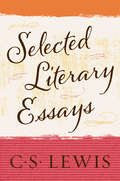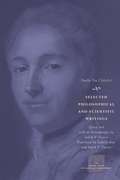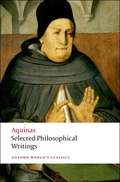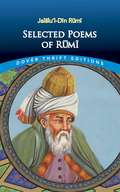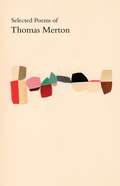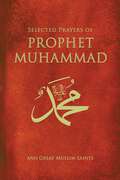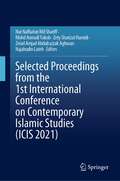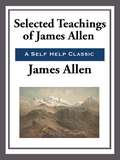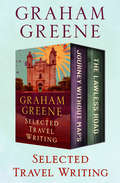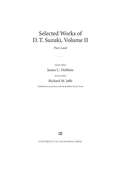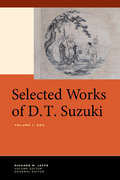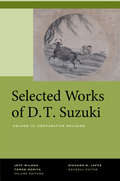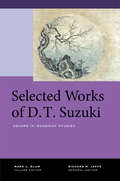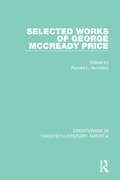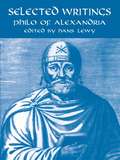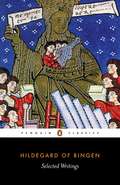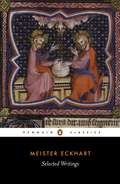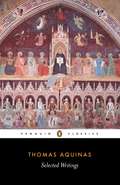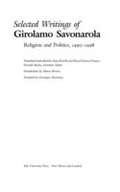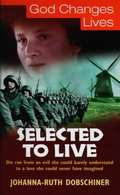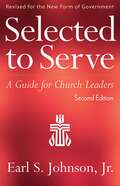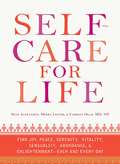- Table View
- List View
Selected Literary Essays
by C. S. LewisSelected Literary Essays includes over twenty of C. S. Lewis's most important literary essays, written between 1932 and 1962. The topics discussed in this volume range from Chaucer to Kipling, from "The literary impact of the authorized version" to "Psycho-analysis and literary criticism," to Shakespeare and Bunyan, and Sir Walter Scott and William Morris. Common to each essay, however, are the lively wit, the distinctive forthrightness, and the discreet erudition which characterize Lewis's best critical writing.
Selected Literary Essays
by C. S. LewisSelected Literary Essays includes over twenty of C. S. Lewis's most important literary essays, written between 1932 and 1962. The topics discussed in this volume range from Chaucer to Kipling, from "The literary impact of the authorized version" to "Psycho-analysis and literary criticism," to Shakespeare and Bunyan, and Sir Walter Scott and William Morris. Common to each essay, however, are the lively wit, the distinctive forthrightness, and the discreet erudition which characterize Lewis's best critical writing.
Selected Literary Essays
by C. S. LewisSelected Literary Essays includes over twenty of C. S. Lewis's most important literary essays, written between 1932 and 1962. The topics discussed in this volume range from Chaucer to Kipling, from "The literary impact of the authorized version" to "Psycho-analysis and literary criticism," to Shakespeare and Bunyan, and Sir Walter Scott and William Morris. Common to each essay, however, are the lively wit, the distinctive forthrightness, and the discreet erudition which characterize Lewis's best critical writing.
Selected Literary Essays
by C. S. LewisSelected Literary Essays includes over twenty of C. S. Lewis's most important literary essays, written between 1932 and 1962. The topics discussed in this volume range from Chaucer to Kipling, from "The literary impact of the authorized version" to "Psycho-analysis and literary criticism," to Shakespeare and Bunyan, and Sir Walter Scott and William Morris. Common to each essay, however, are the lively wit, the distinctive forthrightness, and the discreet erudition which characterize Lewis's best critical writing.
Selected Philosophical And Scientific Writings (Jossey-bass Guides To Online Teaching And Learning)
by Judith P. Zinsser Isabelle Bour Emilie Du ChâteletThough most historians remember her as the mistress of Voltaire, Emilie Du Châtelet (1706–49) was an accomplished writer in her own right, who published multiple editions of her scientific writings during her lifetime, as well as a translation of Newton’s Principia Mathematica that is still the standard edition of that work in French. Had she been a man, her reputation as a member of the eighteenth-century French intellectual elite would have been assured. In the 1970s, feminist historians of science began the slow work of recovering Du Châtelet’s writings and her contributions to history and philosophy. For this edition, Judith P. Zinsser has selected key sections from Du Châtelet’s published and unpublished works, as well as related correspondence, part of her little-known critique of the Old and New Testaments, and a treatise on happiness that is a refreshingly uncensored piece of autobiography—making all of them available for the first time in English. The resulting volume will recover Châtelet’s place in the pantheon of French letters and culture.
Selected Philosophical Writings of Thomas Aquinas
by Timothy McdermottSt. Thomas Aquinas (1225-1274) saw religion as part of the natural human inclination to worship. This translation offers thirty-eight substantial passages, fully illustrating the breadth and progression of Aquinas's philosophy.
Selected Poems of Rumi (Dover Thrift Editions)
by Jalalu’l-Din RumiMore than 100 stirring, unforgettable lyrics by the great 13th century Sufi teacher and mystical poet include "The Marriage of True Minds," "The Children of Light," "The Man Who Looked Back on His Way to Hell," "The Ascending Soul," "The Pear-Tree of Illusion," "The Riddles of God," and many others. Translated by R. A. Nicholson.
Selected Poems of Thomas Merton: New Selected Poems Of Thomas Merton
by Thomas MertonPoet, Trappist monk, religious philosopher, translator, social critic: the late Thomas Merton was all these things. This classic selection from his great body of poetry affords a comprehensive view of his varied and progressively innovative work. Selected by Mark Van Doren and James Laughlin, this slim volume is now available again as a wonderful showcase of Thomas Merton’s splendid poetry.
Selected Prayers Of Prophet Muhammad
by M. Fethullah GülenThis book consists of prayers categorized according to various occasions: morning and evening prayers connected with purification, food, drink, pilgrimage, marriage, everyday life situations. Additional sections include the most beautiful names of God, prayer for help and victory, and other prayers to be read at any time.
Selected Proceedings from the 1st International Conference on Contemporary Islamic Studies (ICIS 2021)
by Nur Nafhatun Md Shariff Najahudin Lateh Zety Sharizat Hamidi Zeiad Amjad Abdulrazzak Aghwan Mohd Asmadi YakobThis book collates selective outputs from the 1st International Conference on Contemporary Islamic Studies, focusing on interdisciplinary research that is relevant and timely. One of the most vital areas for national development in Malaysia, and other parts of the Muslim world, is the field of Islamic studies. With a selection of regional and international contributions, the volume covers several topics, including Zakat, Wakaf, Islamic philanthropy, Islamic Turath, Islamic astronomy, Islamic texts - both ancient and modern - Halal, the Muslim family, fiqh, and Islamic finance. Cutting across both academia and religious practice, the book seeks to demarcate various aspects within Islamic law and culture, in the context of the IR 4.0 era. It is relevant to students and researchers working within the interdisciplinary landscape of Islamic studies, from Asia to beyond.
Selected Teachings of James Allen
by James AllenJames Allen was one of our finest thinkers. In this five-in-one omnibus edition Allen show's you the power of positive thinking and a path to prosperity with dignity. These teachings are as timeless today as they were when they were written. Many of today's best sellers, such as The Power of Positive Thinking, Laws of Attraction, and The Science of Success, and The Secret owe a deep and abiding debt to these great works. Now you can read the words of the master. This edition includes: As a Man Thinketh, The Way of Peace, Above Life's Turmoil, Byways to Blessedness, and The Path of Prosperity. www.wilderpublications.com
Selected Travel Writing: Journey Without Maps and The Lawless Roads
by Graham GreeneA pair of revelatory travel memoirs from &“a superb storyteller . . . [who] had a talent for depicting local color&” (The New York Times). &“One of the finest writers of any language,&” British author Graham Greene embarked on two awe-inspiring and eye-opening journeys in the 1930s—to West Africa and to Mexico (The Washington Post). Greene would find himself both shaken and inspired by these trips, which would go on to inform his novels. Journey Without Maps: When Graham Greene set off from Liverpool in 1935 for what was then an Africa unmarked by colonization, it was to leave the known transgressions of his own civilization behind for those unknown. First by cargo ship, then by train and truck through Sierra Leone, and finally on foot, Greene embarked on a dangerous and unpredictable 350-mile, four-week trek through Liberia with his cousin and a handful of servants and bearers into a world where few had ever seen a white man. For Greene, this odyssey became as much a trip into the primitive interiors of the writer himself as it was a physical journey into a land foreign to his experience. &“One of the best travel books [of the twentieth] century.&” —The Independent The Lawless Roads: This eyewitness account of religious and political persecution in 1930s Mexico inspired The Power and the Glory, the British novelist&’s &“masterpiece&” (John Updike). In 1938, Greene, a burgeoning convert to Roman Catholicism, was commissioned to expose the anticlerical purges in Mexico. Churches had been destroyed, peasants held secret masses in their homes, religious icons were banned, and priests disappeared. Traveling under the growing clouds of fascism, Greene was anxious to see for himself the effect it had on the people. Journeying through the rugged and remote terrain of Chiapas and Tabasco, Greene&’s emotional, gut response to the landscape; the sights and sounds; the oppressive heat; and the people&’s fear, despair, resignation, and fierce resilience makes for a vivid and powerful chronicle. &“[A] singularly beautiful travel book.&” —New Statesman
Selected Works of D. T. Suzuki, Volume II: Pure Land
by James C. Dobbins Richard M. JaffeDaisetsu Teitaro Suzuki was a key figure in the introduction of Buddhism to the non-Asian world. Many outside Japan encountered Buddhism for the first time through his writings and teaching, and for nearly a century his work and legacy have contributed to the ongoing religious and cultural interchange between Japan and the rest of the world, particularly the United States and Europe. This second volume of Selected Works of D. T. Suzuki brings together Suzuki's writings on Pure Land Buddhism. At the center of the Pure Land tradition is the Buddha Amida and his miraculous realm known as paradise or "the land of bliss," where sentient beings should aspire to be born in their next life and where liberation and enlightenment are assured. Suzuki, by highlighting certain themes in Pure Land Buddhism and deemphasizing others, shifted its focus from a future, otherworldly goal to religious experience in the present, wherein one realizes the nonduality between the Buddha and oneself and between paradise and this world. An introduction by James C. Dobbins analyzes Suzuki's cogent, distinctive, and thought-provoking interpretations, which helped stimulate new understandings of Pure Land Buddhism quite different from traditional doctrine.
Selected Works of D.T. Suzuki, Volume I
by Daisetsu Teitaro SuzukiDaisetsu Teitaro Suzuki was a key figure in the introduction of Buddhism to the non-Asian world. Many outside of Japan encountered Buddhism for the first time through his writings and teaching, and for nearly a century his work and legacy have contributed to the ongoing religious and cultural interchange between Japan and the rest of the world, particularly the United States and Europe. Selected Works of D. T. Suzuki gathers the full range of Suzuki's writings--both classic essays and lesser-known but equally significant articles. This first volume in the series presents a collection of Suzuki's writings on Zen Buddhist thought and practice. In an effort to ensure the continued relevance of Zen, Suzuki drew on his years of study and practice, placing the tradition into conversation with key trends in nineteenth- and twentieth-century thought. Richard M. Jaffe's in-depth introduction situates Suzuki's approach to Zen in the context of modern developments in religious thought, practice, and scholarship. The romanization of Buddhist names and technical terms has been updated, and Chinese and Japanese characters, which were removed from many post-World War II editions of Suzuki's work, have been reinstated. This will be a valuable edition of Suzuki's writings for contemporary scholars and students of Buddhism.
Selected Works of D.T. Suzuki, Volume III: Comparative Religion
by Daisetsu Teitaro SuzukiDaisetsu Teitaro Suzuki was a key figure in the introduction of Buddhism to the non-Asian world. Many outside Japan encountered Buddhism for the first time through his writings and teaching, and for nearly a century his work and legacy have contributed to the ongoing religious and cultural interchange between Japan and the rest of the world, particularly the United States and Europe. This third volume of Selected Works of D. T. Suzuki brings together a diverse collection of Suzuki's letters, essays, and lectures about non-Buddhist religions and his thoughts on their relation to Buddhism, as well as his reflections on the nature of religion itself. Some of these writings have been translated into English for the first time in this volume. As a long-term resident of the United States, a world traveler, and a voracious consumer of information about all forms of religion, Suzuki was one of the foremost Japanese mediators of Eastern and Western religious cultures for nearly seven decades. An introduction by Jeff Wilson and Tomoe Moriya analyzes Suzuki's frequent encounters with texts and practitioners of many religions, considers how events in Suzuki's lifetime affected his interpretations of Christianity, Shinto, and other traditions, and demonstrates that his legacy as a scholar extends well beyond Buddhism.
Selected Works of D.T. Suzuki, Volume IV: Buddhist Studies
by Daisetsu Teitaro SuzukiDaisetsu Teitar?¯ Suzuki was a key figure in the introduction of Buddhism to the non-Asian world. Many outside Japan encountered Buddhism for the first time through his writings and teaching, and for nearly a century his work and legacy have contributed to the ongoing religious and cultural interchange between Japan and the rest of the world, particularly the United States and Europe. This fourth volume of Selected Works of D. T. Suzuki brings together a range of Suzuki’s writings in the area of Buddhist studies. Based on his text-critical work in the Chinese canon, these essays reflect his commitment to clarifying Mahayana Buddhist doctrines in Indian, Chinese, and Japanese historical contexts. Many of these innovative writings reflect Buddhological discourse in contemporary Japan and the West’s pre-war ignorance of Mahayana thought. Included is a translation into English for the first time of his "Mahayana Was Not Preached by Buddha." In addition to editing the essays and contributing the translation, Mark L. Blum presents an introduction that examines how Suzuki understood Mahayana discourse via Chinese sources and analyzes his problematic use of Sanskrit.
Selected Works of George McCready Price
by Ronald L. NumbersOriginally published in 1995, The Selected Works of George McCready Price is the seventh volume in the series, Creationism in Twentieth Century America, reissued in 2021. The volume brings together the original writings and pamphlets of George McCready Price, a leading creationist of the early antievolution crusade of the 1920s. McCready Price labelled himself the ‘principal scientific authority of the Fundamentalists’ and as a self-taught scientist he enjoyed more scientific repute amongst fundamentalists of the time. This interesting and unique collection of original source material includes five of his writings between 1906 and 1924, challenging the new Darwinian theory of evolution and natural selection through his writings on the natural sciences. His literature covers the topics of evolution and biology and critiques biological arguments for evolution. He also wrote widely on geology offering his own alternative argument of ‘flood geography’ in opposition to the Darwinian theory concerning palaeontology and geology. This volume will be of interest to historians of natural history and the creationism movement, as well as scholars of religion and American history.
Selected Writings
by Philo Hans LewyThese selections illuminate Philo's crucial role in assimilating Greek philosophy to biblical religion and accommodating Jewish belief to Greek thought. Topics include the knowledge of God; the mystic way; the soul and her God; man's humility, hope, faith, and joy; vices and virtues; and Israel and the nations.
Selected Writings
by Hildegard of BingenBenedictine nun, poet and musician, Hildegard of Bingen (1098-1179) was one of the most remarkable figures of the Middle Ages. She undertook preaching tours throughout the German empire at the age of sixty, and was consulted not only by her religious contemporaries but also by kings and emperors, yet it is largely for her apocalyptic and mystical writings that she is remembered. This volume includes selections from her three visionary works, her treatises on medicine and the natural world, her devotional songs, and fascinating letters to prominent figures of her time. Dealing with such eternal subjects as the relationship between humans and nature, and men and women, Hildegard's works show her to be a wide-ranging thinker who created such fresh, startling images and ideas that her writings have been compared to Dante and Blake.
Selected Writings
by Meister EckhartComposed during a critical time in the evolution of European intellectual life, the works of Meister Eckhart (c. 1260-1327) are some of the most powerful medieval attempts to achieve a synthesis between ancient Greek thought and the Christian faith. Writing with great rhetorical brilliance, Eckhart combines the neoplatonic concept of oneness - the idea that the ultimate principle of the universe is single and undivided - with his Christian belief in the Trinity, and considers the struggle to describe a perfect God through the imperfect medium of language. Fusing philosophy and religion with vivid originality and metaphysical passion, these works have intrigued and inspired philosophers and theologians from Hegel to Heidegger and beyond.
Selected Writings (World's Classics Ser.)
by Thomas AquinasIn his reflections on Christianity, Saint Thomas Aquinas forged a unique synthesis of ancient philosophy and medieval theology. Preoccupied with the relationship between faith and reason, he was influenced both by Aristotle's rational world view and by the powerful belief that wisdom and truth can ultimately only be reached through divine revelation. Thomas's writings, which contain highly influential statements of fundamental Christian doctrine, as well as observations on topics as diverse as political science, anti-Semitism and heresy, demonstrate the great range of his intellect and place him firmly among the greatest medieval philosophers.
Selected Writings of Girolamo Savonarola: Religion and Politics, 1490-1498
by Girolamo Savonarola Anne Borelli Maria Pastore PassaroFive hundred years after his death at the stake, Girolamo Savonarola remains one of the most fascinating figures of the Italian Renaissance. This wide-ranging collection, with an introduction by historian Alison Brown, includes translations of his sermons and treatises on pastoral ministry, prophecy, politics, and moral reform, as well as the correspondence with Alexander VI that led to Savonarola's silencing and excommunication. Also included are first-hand accounts of religio-civic festivities instigated by Savonarola and of his last moments. This collection demonstrates the remarkable extent of Savonarola's contributions to the religious, political, and aesthetic debates of the late fifteenth century.
Selected to Serve
by Earl S. Johnson Jr.Earl S. Johnson, Jr. , has created an accessible, popularly written textbook for Presbyterian churches that covers all aspects of officer training--call, duties, ethics, the Presbyterian Constitution, and much more. Congregations will find this resource indispensable for the recruitment and training of effective church leaders.
Self Care for Life
by Meera Lester Carolyn Dean Skye AlexanderThe best way to take care of your self is to take care of your Self. With its unique three-fold approach, this book helps you nurture and nourish the mind, body, and spirit within the natural course of every day: Mind Take a break from the (bad) news. It's hard to find spiritual sustenance and renewal in a world rocked by tension. So turn off the television and radio, stay off the Internet, and stop the daylong bombardment of negativity from virtually every media outlet. Body Drink a cup of gyokuro tea. Theanine is an amino acid that increases alpha brainwave activity--and gyokuro tea is chock full of it. One cup of this Japanese green tea and you'll be calmer and wiser for up to four hours. Spirit Choose a natural talisman. A talisman is a token chosen to create a certain effect. Crystals, stones, and feathers are natural talismans you can use to protect yourself from anxiety, relieve stress, and remind you who you really are. From alternative medicine and ayurvedic nutrition to chakra healing and tantric sex, this book allows you to weave self-care into the weft and woof of your lives, transforming your lives--moment to moment, hour to hour, day to day.
